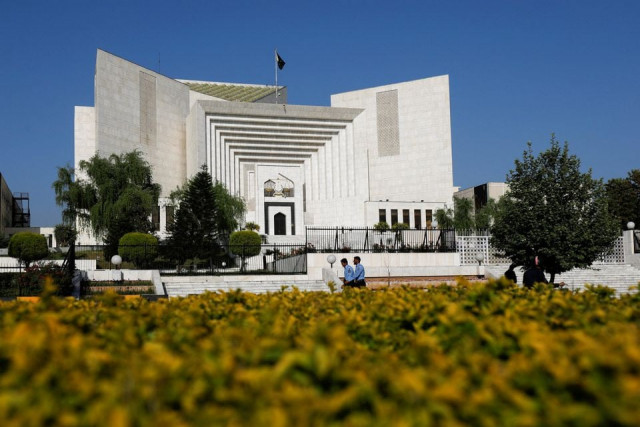Article 209 doesn’t apply to retired judges, rules SC
Top court sets aside petition seeking guidelines for Supreme Judicial Council

The Supreme Court has held that Article 209 — which deals with the removal of a superior court judge on account of misconduct — does not apply to a person who has retired or resigned from the office of a judge of the apex court or a high court.
“On the logic of the proposition such a complaint (against alleged misconduct of a superior court judge) could conceivably be filed even years after the retirement or resignation.
“Such an outcome is quite obviously beyond the contemplation of the Constitution. This is yet another reason why the proposition postulated cannot be regarded as correct," said a six-page order authored by Justice Munib Akhtar.
Justice Akhtar was part of a division bench also including Justice Ijazul Ahsan that dismissed a constitution petition filed by civil society members seeking guidelines to the Supreme Judicial Council (SJC), the constitutional forum that can hold judges of superior court accountable.
The verdict said the Constitution draws a distinction between a person, who, at the relevant time, holds office as a judge and the one, who, having held that office in the past, does not. It said Article 209 applies only to the former and not the latter.
“Thus, e.g., clauses (2) and (3) of Article 202 refer, respectively, to a ‘person who has held office’ ‘as a judge of the Supreme Court or of a High Court’ or ‘as a permanent Judge’.
“In similar vein, Article 182 allows, inter alia, for ‘a person who has held the office of a judge of [the Supreme] Court’ to attend sittings of the court as an ad hoc judge, and then goes on to state that “while so attending an ad hoc judge shall have the same power and jurisdiction as a judge of the SC”.
Other such examples, it said, are also to be found. This bolsters the conclusion that Article 209 has no application in the postulated situation.
Finally, it must be noted that if accepted the logic of the proposition could be taken to the point that a complaint could even be filed under Article 209 against a judge who has retired or resigned after he has left office, in relation to allegations of misconduct while in office.
This is so because the petitioners advance the proposition on the basis of what they regard to be a matter of principle.
If such a principle exists then arguably its application cannot be limited to the fortuitous circumstance as to whether there was a complaint pending against the allegedly errant judge as on the date he retired or resigned.
“On the logic of the proposition such a complaint could conceivably be filed even years after the retirement or resignation. Such an outcome is quite obviously beyond the contemplation of the Constitution. This is yet another reason why the proposition postulated cannot be regarded as correct.”
The judgment noted that the petitioners asked this court to give directions or guidelines to regulate the case management of the SJC’s docket, a list of cases for trial or people having cases pending.
“It is our view that, with respect, it would be inappropriate to do so.
“Firstly, such directions or guidelines would either, in terms, be so general or broad as to end up being essentially no more than mere platitudes, or be so detailed and minute as to essentially take over the functions and powers of the Council.
“Neither outcome would, for obvious reasons, be desirable. In particular, the latter may be contrary to what is within the jurisdiction of the Court in relation to Article 209. Secondly, if some balance can be struck between these two extremes, there would still be a difficulty.”
It said any directions issued or guidelines laid down would of course hold the field over time and therefore and thereby tend to end up providing too rigid and even, eventually, ossified a framework for the SJC.
"This would be so because it would not be possible for the latter to itself alter (or even replace) the framework so erected, in order to meet the inevitable changes over time in its docket—both as to the quantum and the nature of the complaints—and other variations in relevant circumstances.
“The council would then have to approach the court from time to time to seek further suitable directions and guidelines, by way of alterations in, or even substitution of, the framework.
“Obviously, such an outcome would not be desirable. The Council ought at all times to have the power to control its own docket and manage its affairs in a flexible manner that suits its purposes and allows it to perform the constitutional duties with which it is tasked.
“We are therefore of the view that it would be inadvisable and inappropriate for the court to grant the relief sought,” it said.
The judgment also referred to SC judgment in the Shaukat Aziz Sadiqui case and said that in this decision the claim was by the judges being proceeded against, as to a denial of their fundamental rights.
Even then, the court held (while recognizing that the judge concerned could waive his right to privacy) that the ultimate decision, as to whether to proceed in terms of paragraph 13 or to allow “open” proceedings, was that of the council itself.
"That decision could be taken at any time and even against the wishes of the judge concerned, for reasons as set out in the earlier part of the judgment. And in respect of the particular cases before it the court did not make an order of its own, leaving it to the council to do so in terms of para 96," it said.



















COMMENTS
Comments are moderated and generally will be posted if they are on-topic and not abusive.
For more information, please see our Comments FAQ